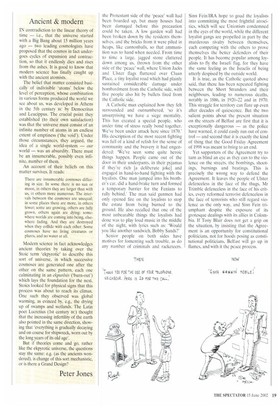Ancient & modern
IN contradiction to the linear theory of time — i.e., that the universe started with a Big Bang about 15 million years ago — two leading cosmologists have proposed that the cosmos in fact undergoes cycles of expansion and contraction, so that it endlessly dies and rises from the ashes. It is good to know that modern science has finally caught up with the ancient atomists.
The belief that matter consisted basically of indivisible 'atoms' below the level of perception, whose combination in various forms produced the world we see about us, was developed in Athens in the 5th century Be by Democritus and Leucippus. The crucial point they established (to their own satisfaction) was that the universe must consist of an infinite number of atoms in an endless extent of emptiness ('the void'). Under those circumstances, they argued, the idea of a single world-system — our world — was an absurdity. There must be an innumerable, possibly even infinite, number of them.
An account of their beliefs on this matter survives. It reads:
There are innumerable cosmoses differing in size. In some there is no sun or moon, in others they are larger than with us, in others more numerous. The intervals between the cosmoses are unequal; in some places there are more, in others fewer; some are growing, others are fully grown, others again are dying; somewhere worlds are coming into being, elsewhere fading. And they are destroyed when they collide with each other. Some cosmoses have no living creatures or plants, and no water at all.
Modern science in fact acknowledges ancient theories by taking over the Stoic term `ekpyrotic' to describe this sort of universe, in which successive cosmoses are generated one after the other on the same pattern, each one culminating in an ekpurasis (turn-out) which lays the foundation for the next. Stoics looked for physical signs that this process was about to reach its climax. One such they observed was global warming, as evinced by, e.g., the drying up of swamps and wetlands. The Latin poet Lucretius (1st century Etc) thought that the increasing infertility of the earth also pointed in the same direction, showing that 'everything is gradually decaying and on course for shipwreck, worn out by the long years of its old age'.
But if theories come and go, rather like the ekpyrotic universe, the questions stay the same: e.g. (as the ancients wondered), is change of this sort mechanistic, or is there a Grand Design?
Peter Jones


































































 Previous page
Previous page